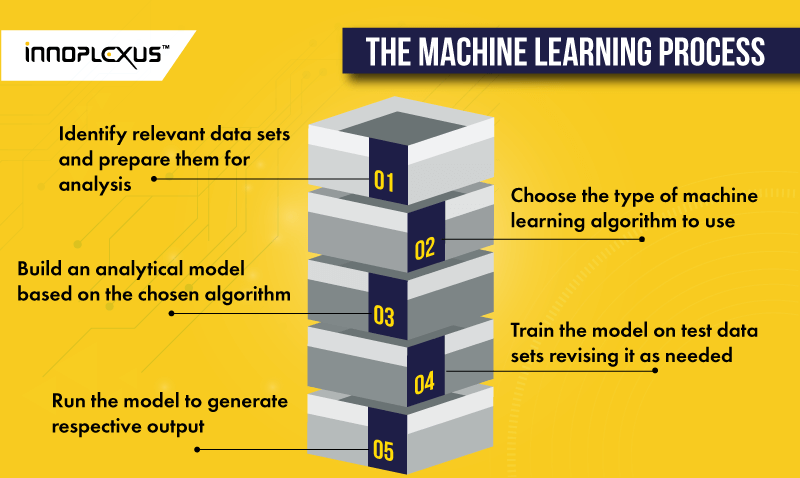
AI pioneer Innoplexus and phytopharmaceutical company DrD are partnering toRead More

AI pioneer Innoplexus and phytopharmaceutical company DrD are partnering toRead More
Mar 24
Mar 24

Innoplexus wins Horizon Interactive Gold Award for Curia App
Read MoreMachine learning (ML) is an integral sub-field of AI or Artificial Intelligence that applies statistical, logical and mathematical techniques in order for computers to progressively learn data processing without exclusive programming. AI plays a vital role in powering innovation.
Just to clarify the difference: The field of data mining has acquired most of its motivation from machine learning. However, data mining is executed by an individual, within a certain situation, on a targeted set of data and with predefined goals and objectives. The ideal objective of this individual is to make the most of the trend recognition techniques that are developed in ML. There are two primary objectives of doing this – either to gain insights in a domain with a small knowledge base or to predict future trends and patterns more efficiently. Some of the standard techniques of data mining include cluster analysis, regression trees and neural networks.
On the other hand, Machine Learning is a set of algorithms that help applications in accurately processing data and predicting output progressively, without having to be explicitly programmed for executing the same. The basic concept of ML is about building systems that can learn from the data and use the learnings to predict or classify outcomes for new data points.
Machine learning plays an important role in data analytics and is applied to situations, where it is too complex to otherwise quantify relationships among various variables. This enables analysts to detect new patterns and repeatedly produce dependable insights with the help of such advanced data processing techniques.

It is broadly classified into two categories:
Supervised machine learning algorithms are trained using “labelled” data, hence they are called supervised. It is like parents try to help kids learn what behaviour is “good” and what is “bad”. “Good” and “Bad” are labels attached to the historical data points related to behaviour. Once the training phase is accomplished, the algorithm will apply then it to the new data inputs to either do predictions or classifications.
The unsupervised machine learning algorithms do not require any such training or supervision. They are useful when the spread of data itself is useful in deriving insights. The few common examples of unsupervised learning are Clustering (Segmentation), Anomaly Detection, etc.
There also are techniques, which can be classified as “Semi-supervised” learning.
Machine learning is applied to every industry that works with large data sets. Effective learning systems provide insights that help businesses make efficient decisions and outdo their competitors. Here are some of the industry use cases to give you an idea of where ML is applied:
![]() The technological enhancements of the twentieth century have given us the boon of wearable devices and sensors that help us assess a patient’s health or activity in real time. Such technology also has the potential to improve healthcare research and help experts assess and analyse enormous amounts of research and medical data to get valuable insights contributing to improved diagnosis, treatment and efficiently expedite life sciences research.
The technological enhancements of the twentieth century have given us the boon of wearable devices and sensors that help us assess a patient’s health or activity in real time. Such technology also has the potential to improve healthcare research and help experts assess and analyse enormous amounts of research and medical data to get valuable insights contributing to improved diagnosis, treatment and efficiently expedite life sciences research.
The application of ML or machine learning in the early stages of drug discovery has a high potential in the initial screening of drug compounds and to predict their success rate based on the respective parameters and factors.
iPlexus is a good example of efficiently applied machine learning that helps generate intelligence and insights across pre-clinical, clinical, regulatory and commercial phases of a drug development to discover most relevant knowledge and new patterns.
![]() The banking and financial industry applies machine learning for various purposes, two of which stand out the most:
The banking and financial industry applies machine learning for various purposes, two of which stand out the most:
![]() Ever used an e-commerce website to order online? Such e-commerce websites efficiently deploy machine learning algorithms to analyse your buying patterns and push the other most relevant items customized and unique to every user. This ability to acquire data, assess and analyse it to personalise a user’s shopping experience is certainly a game changer in the retail industry. Recommendation Engines are one such example.
Ever used an e-commerce website to order online? Such e-commerce websites efficiently deploy machine learning algorithms to analyse your buying patterns and push the other most relevant items customized and unique to every user. This ability to acquire data, assess and analyse it to personalise a user’s shopping experience is certainly a game changer in the retail industry. Recommendation Engines are one such example.
![]() The global transportation infrastructure relies on making transportation efficient by predicting problems and solving the same before they arise. Machine learning in the transportation industry help plays a key role in identifying such trends and patterns to improve predictive capabilities.
The global transportation infrastructure relies on making transportation efficient by predicting problems and solving the same before they arise. Machine learning in the transportation industry help plays a key role in identifying such trends and patterns to improve predictive capabilities.
Machine Learning is a very narrow field. But in only a few years, it will become part of nearly every software application and will bring benefit to every industry and our daily lives. It replaces manual, repeatable processes. Thus, it is a must for us to comprehend the concept of ML and apply it for the betterment of humanity. This is exactly what Innoplexus does.
The cost of developing a new drug roughly doubles every nine years (inflation-adjusted) aka Eroom’s law. As the volume of data…
There was a time when science depended on manual efforts by scientists and researchers. Then, came an avalanche of data…
Collaboration with key opinion leaders and influencers becomes crucial at various stages of the drug development chain. When a pharmaceutical…
Data are not the new gold – but the ability to put them together in a relevant and analyzable way…
Artificial intelligence, or AI, is gaining more attention in the pharma space these days. At one time evoking images from…
Artificial intelligence (AI) is transforming the pharmaceutical industry with extraordinary innovations that are automating processes at every stage of drug…
There is a lot of buzz these days about how artificial intelligence (AI) is going to disrupt the pharmaceutical industry….
Drug discovery plays a key role in the pharma and biotech industries. Discovering unmet needs, pinpointing the target, identifying the…
The pharmaceutical industry spends billions on R&D each year. Clinical trials require tremendous amounts of effort, from identifying sites and…
Training algorithms to identify and extract Life Sciences-specific data The English dictionary is full of words and definitions that can be…
The early 1970s introduced the world to the idea of computer vision, a promising technology automating tasks that would otherwise…
Summary: AI could potentially speed drug discovery and save time in rejecting treatments that are unlikely to yield worthwhile resultsAI has…